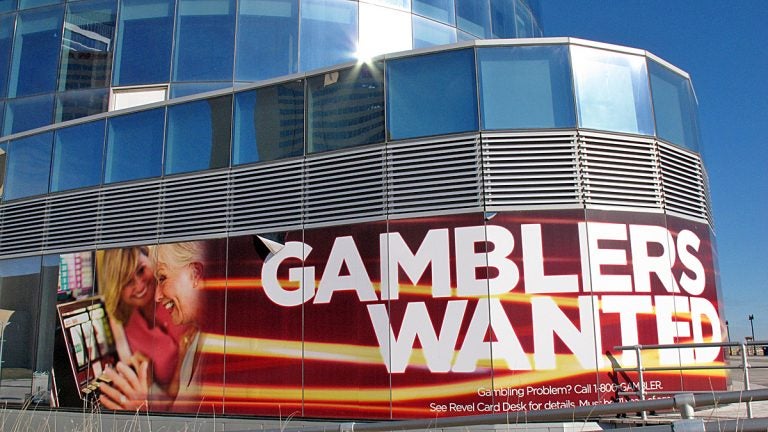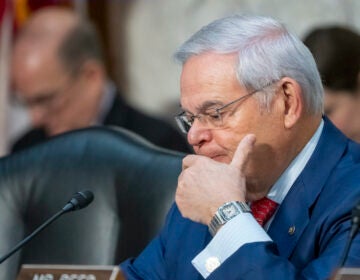Calls to expand gambling to North Jersey getting louder

This Dec. 27, 2013 photo shows a banner outside Revel Casino Hotel in Atlantic City N.J. (AP Photo/Wayne Parry)
Thirty-six years ago, when Resorts International opened its doors, gaming proponents envisioned Atlantic City as the new Las Vegas, a resort city with a gambling monopoly in the heart of the populous Northeast.
Not anymore.
With New York and Pennsylvania cashing in on soaring gaming revenues, while Atlantic City casinos fold, it looks as if New Jersey voters will get a chance to vote on whether to add casinos in North Jersey – although not until after North and South Jersey powerbrokers decide how to split the state’s take.
Sens. Raymond Lesniak (D-Union) and Paul Sarlo (D-Bergen) proposed legislation Thursday that would seek voter approval for a constitutional amendment that would add two casinos in North Jersey — one presumably in Jersey City, where a former Reebok CEO wants to build a 95-story casino, with a 100,000-seat auto racetrack and the world’s largest Ferris wheel, and the other at the Meadowlands Sports Complex.
But while Senate President Stephen Sweeney (D-Gloucester) is willing to consider ending Atlantic City’s monopoly as one casino after another declares bankruptcy, he said “the discussion’s going to start with, ‘How does Atlantic City benefit from whatever we do?’
“Lesniak’s bill gives Atlantic City $100 million a year for 10 years? That’s a good starting point, but that’s not where we’re going to finish,” Sweeney said. “For 30 years, Atlantic City sent money all over the state to pay for projects out of casino revenues. Now we’re going to lose 6,000 casino jobs by September in a region with the worst unemployment. We’re not going to turn our backs on Atlantic City.”
Sweeney insisted that the Legislature “has until next July to figure it out — nothing’s going on the ballot this year.”
Sweeney’s willingness to consider a November 2015 referendum represents a tacit admission by Sweeney and Christie that the Atlantic City tourism development district they created in 2011 to transform the city into a family vacation destination along the lines of Las Vegas is not going to achieve success quickly — if at all — and that there is no need to keep their promise to preserve Atlantic City’s casino monopoly until 2016 to see if a miraculous turnaround will occur.
In fact, Lesniak and other proponents of putting an expansion of casino gambling on the ballot this November — rather than waiting until 2015 — got new ammunition for their arguments on Saturday, when Trump Plaza became the fourth of Atlantic City’s 12 casinos to announce plans to close this year.
Combined with the shutdown of the Atlantic Club in January, the expected rapid-fire closures of Showboat, Revel, and Trump Plaza between late August and mid-September would bring the year’s job loss in Atlantic City’s casino industry to 7,600.
The three planned closures would drop the city’s total number of casinos to eight — one more than the seven opened since 2006 in eastern Pennsylvania — all just a short drive from the New Jersey border. That’s how the Keystone State was able to pass New Jersey, which has had casino gambling since 1978, for second place in casino revenue after Nevada.
The decline of Atlantic City’s casino industry guarantees that casino tax receipts will drop for the eight straight year — at a time when New Jersey is facing a budget crisis that forced Gov. Chris Christie to cut state pension contributions by $900 million in the past fiscal year and $1.5 billion this year.
While casinos in North Jersey won’t solve the state’s budget problems, the $500 million in casino tax revenue Lesniak and Sarlo want to generate through a 50 percent tax on profits at two North Jersey casinos would be a big help.
In fact, the state’s take from the two North Jersey casinos would be more than twice as much as the $220 million Atlantic City’s casinos generate, and that does not include the tax revenue generated from the 26,000 jobs created, the $4.6 billion construction cost of the Jersey City casino alone, and economic spinoffs from the racetrack, the Ferris wheel, and related investments, Lesniak said.
Meanwhile, Atlantic City’s long-term competitiveness in the gaming arena isn’t likely to get any better, even with the advent of New Jersey’s first-in-the-nation online gaming, which took in just $10 million in its first seven months of operation.
New York State, which generated $435 million last year from its Resorts World Casino at Aqueduct Racetrack, is expected to approve a new casino to open in 2016 at Woodbury Commons on Route 287 or at the Sterling Forest resort in Tuxedo, NY, both just across the New Jersey border. Three new casinos in New York City and its suburbs could be approved in 2021.
“If you’re going to make a commitment to expand casino gambling like this, it makes sense to do it sooner rather than later, and not allow competitors like New York State to get ahead of us,” said Senate Minority Leader Tom Kean (R-Union).
Kean said the constitutional amendment expanding casino gambling would not only have to help Atlantic City, but should also provide financial support to Monmouth Park Racetrack in Oceanport and the state’s thoroughbred and standard-bred horse-racing industry. Other states, including New York, Pennsylvania and Delaware, have bolstered the profitability of their racetracks by allowing them to install slot machines — which New Jersey does not plan to do — and the state’s horse farms preserve open space, Kean noted.
While the deadline for approval of a constitutional amendment is August 2, Kean noted that Christie and legislative leaders have “figured out bigger issues in a shorter time than this.”
Lesniak was not optimistic. “In this state, it takes three to tango — Christie, Sweeney, and (Assembly Speaker Vincent) Prieto (D-Hudson),” Lesniak said. “It appears we’re running out of time to get the support we need to put a referendum on the ballot this year.”
Nevertheless, “my concern is not that New York will beat us, because the Liberty National proposal can’t be duplicated,” Lesniak said, thumbing through slides for the Jersey City casino development proposal during a break in Thursday’s Senate Judiciary Committee hearing.
Lesniak said the plan by Paul Fireman, the founder of Reebok International, Ltd., who built the Liberty National Golf Course in 2006, would rival China’s opulent Macau casinos as a tourist destination.
Moreover, the 107,500-seat racetrack and the giant Ferris wheel would provide the spectacular nongaming attractions that Atlantic City dreams of adding as tourist draws — all within 50 miles of a population of 16 million people.From the standpoint of New Jersey’s economy and tax revenues, the Jersey City megacasino development project — coupled with a casino at the Meadowlands accessible to Giants-Jets stadium, the Meadowlands racetrack, and the American Dream megamall that is once again underway — is a clear winner, Lesniak and other proponents argue.
However, South Jersey has wielded considerable political power during Christie’s four-and-a-half years as governor, and that’s not going to change when it comes to how casino gambling in North Jersey affects Atlantic City — not when Sweeney, as Senate president, has unilateral power over whether bills get posted for a vote.
Sweeney and South Jersey Democratic powerbroker George Norcross have wielded the balance of power in concert with Christie on everything from the controversial pension and benefits legislation to interest arbitration limits, tenure reform, the merger of the state’s medical schools into Rutgers University, the development of a county police force to patrol Camden, and the creation of expansion of charter and renaissance schools.
Atlantic City’s casinos affect the entire South Jersey economy, Sweeney said, noting that 1,700 residents of his home county of Gloucester commute the width of the state to jobs in the casino industry.
“When the casino industry sheds jobs, it affects everybody down here,” Sweeney said, noting that the casino industry once employed 48,000 people. If Revel and Trump Plaza are unable to find buyers and join Showboat in closing their doors by September, Atlantic City’s casinos will employ fewer than 23,000 workers.
“Atlantic City started out as a resort, then it became a city with gambling, and now it has to become a resort again with casinos as just one of its attractions,” Sweeney said. “We have to go ‘Back to the Future,’ like Las Vegas did in the 1990s when it started to diversify with non-gaming attractions.”
That will require more money than Atlantic City’s struggling casinos can provide – with the new Jersey City and Meadowlands facilities the logical source to kick in more than the $100 million a year for 10 years that the Lesniak-Sarlo legislation has proposed.
“It would only be fair,” Sweeney said, noting that 10s of millions of dollars of Casino Reinvestment Development Authority (CRDA) funds generated from casino revenues that were originally limited to projects in Atlantic City ended up going to projects all over the state.
If Christie and the Legislature have a year to put together the proposed constitutional amendment, the list of potential sites outside Atlantic City could expand from the two envisioned in Jersey City and the Meadowlands, said one legislator who asked not to be identified.
“If the point is to maximize revenues — both for the state and to take care of Atlantic City — you could end up with a referendum limiting casino expansion to five casinos, for example, rather than two,” the legislator said.
“Maybe Norcross wants one in Camden to help that city’s redevelopment and compete directly with the Philadelphia-area casinos, and maybe we want one up in Vernon by Great Gorge to keep residents of the northwestern counties from going to the Poconos. You could even have one in Middlesex. You only want to go through the constitutional amendment process once,” the legislator said.
_________________________________________
NJ Spotlight, an independent online news service on issues critical to New Jersey, makes its in-depth reporting available to NewsWorks.
WHYY is your source for fact-based, in-depth journalism and information. As a nonprofit organization, we rely on financial support from readers like you. Please give today.




